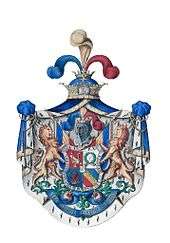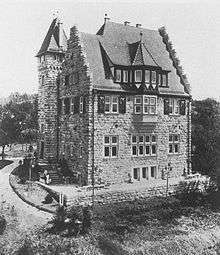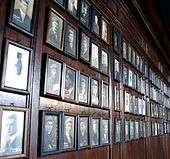Landsmannschaft Schottland
The Landsmannschaft Schottland ("Scotland") is a German fraternity – not to be confused with the American variety – situated in Tübingen, a university city in south-western Germany. It is a brotherhood of students and alumni of University of Tübingen, with membership being a lifelong commitment.


Schottland was founded on 19 November 1849. The name comes from an early meeting place of members, a pub called the "Schottei". Since 1905, Schottland resides in its fraternity house, a multi-storey mansion in the style of a Scottish castle, on the top of a hill overlooking Tübingen.
The members of Schottland commit themselves to the principles of tolerance and democracy as well as the tradition of "akademisches Fechten" (academic fencing), a variety of fencing. A "Band" (a type of ribbon or sash) in the colours blue-gold-red and the traditional student cap (in Tubingen-style) in blue are worn by members. The colours are derived from the old Scottish royal colours. Schottland is a member of an association of about 100 fraternities, that practice obligatory fencing and wear colours – the Coburger Convent.
The fraternity's slogan is "Amicitia honos virtus" (Latin for: "friendship - honour - virtue") and its motto is "Vera amicitia fructus virtutis!" (Latin for: "true friendship is the fruit of the virtuous").
Notable members

- Georg Bretschneider, former vice president of Bundesrechnungshof
- Rolf Emmrich, professor of internal medicine
- Friedrich Graf Medem, zoologist and representative of the IUCN Crocodiles Specialist Group in South America
- Ernst von Mohl, professor in Saint Petersburg
- Hugo Restle, former CEO of Agrippina Versicherungs AG (insurance company)
- Friedrich von Riekert, DVP-politician in Prussia and member of Reichstag (German Empire)
- Jonathan Roth, BDL-politician in Prussia and member of Reichstag (German Empire)
- Karl Friedrich Schmidhuber, professor of Dentistry at the Heidelberg University
- Heinrich Schönfelder, lawyer, founder of the well-known collection of German legal code "Schönfelder"
- Alexander von Zagareli, professor at St. Petersburg University and co-founder of Tbilisi State University
External links
| Wikimedia Commons has media related to Landsmannschaft Schottland. |